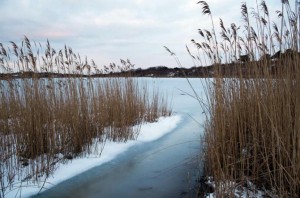20
Feb
Town Asks MA Supreme Court to Affirm Right to Stop Private Pesticide Use in Sensitive Pond
(Beyond Pesticides, February 20, 2014) The town of Chilmark located on Martha’s Vineyard, Massachusetts is not backing down from its decision to challenge property owners and the local conservation commission’s attempts to introduce a toxic herbicide directly into the waters of the only enclosed, great pond of the well-known, destination island.
While one might assume that the litigation centers around whether or not the herbicide proposed for use in the local water source poses as a danger, this issue is only a sideline debate. Instead, the central dispute highlights one of the greatest challenges facing local governments surrounding pesticide control and a locality’s authority to protect both its citizens and its local environment from the hazards that these chemicals bestow: preemption.
Preemption is the ability of one level of government to override laws of a lower level. While local governments once had the ability to restrict the use of pesticides on all land within their jurisdictions, pressure from the chemical industry led many states to pass legislation that prohibits municipalities from adopting local pesticide ordinances affecting the use of pesticides on private property that are more restrictive than state policy.
Unfortunately, Massachusetts is one of the many states that has enacted preemptive pesticide legislation, but this did not stop the town of Chilmark from doing what it thought was necessary to protect a valuable natural resource. When a 62-page environmental study of Squibnocket Pond, conducted by Marine Policy Center in Woods Hole, came to a troubling though unsurprising finding that the pond was significantly threatened by contaminants like pesticides, the town knew that it needed to take action by putting in place a local bylaw.
Enacted in 1990, the bylaw established several protective standards, one of which included a prohibition on the use of chemical fertilizers, pesticides, and herbicides within 500 feet of the pond. The herbicide at issue in the current litigation, Rodeo, is an herbicide that utilizes the active ingredient glyphosate.
Dangers of Glyphosate
Studies have linked glyphosate and the other inert ingredients in products like Rodeo to serious human health and environmental concerns, including non-Hodgkin lymphoma, breast cancer, attention deficit hyperactivity disorder (ADHD), risks of late-term abortion, and endocrine-disruption.
Put this kind of chemical in the water in and around water and the list of potential impacts expands. Studies of glyphosate’s adverse effects on fish include immune-system dysfunction and damage to gills and livers. Even at normal levels found in the environment, glyphosate has been found to be extremely lethal to amphibians. These effects on aquatic species and the fact that glyphosate does not readily break down in water or sunlight are all behind the U.S. Environmental Protection Agency’s (EPA) decision to set a maximum contaminant level of 0.7 parts per million.
Is spraying necessary?
With all of these hazards, it is perplexing why anyone would want to spray such a chemical anywhere, let alone an ecologically sensitive and threatened waterway. Yet, property owners and the conservation commission argue that the spraying is necessary to control the invasive species Phargmites. Otherwise known as the common reed, Phragmites are a large perennial grass found in wetlands. While a challenging invasive species, alternatives for control do exist and should be exhausted.
The town of Chilmark can take comfort that it is not alone its fight, both within Massachusetts and across the country. Beyond Pesticides along with other advocacy groups recently weighed-in on a similar debate concerning NSTAR’s 2014 proposal to maintain rights-of-way through toxic chemical means. In our comments to the Massachusetts Department of Agricultural Resources (MDAR), Beyond Pesticides notes that any vegetation management plan that ignores the state-law mandated step of implementing mechanical, biological, and alternative controls before chemical controls, violates the purpose of Massachusetts pesticide control law.
In particularly sensitive areas like Martha’s Vineyard and Cape Cod, these precautionary measures are even more necessary and allowing local governments to emphasize this general state-law purpose through more clearly defined ordinances and bylaws should not be viewed as running counter to the state’s authority. Beyond Pesticides supports the rights of local government to protect public health and the environment, especially in a regulatory climate where federal and state government are not adequately protective or interested in local conservation.
Source and Photo Credit: Vineyard Gazette
All unattributed positions and opinions in this piece are those of Beyond Pesticides











Pesticides and Herbicides must be — and will be — banned throughout the Planet.
Let us see this happen — and now.
February 20th, 2014 at 1:01 pmTo quote: In the case of Stockbridge Bowl Association, Inc. v. Town of Stockbridge Conservation Commission
February 5th, 2022 at 8:36 pm‘I. Preemptive Effect of the Pesticide Control Act
The Association first argued that the Massachusetts Pesticide Control Act precluded and prevented the Commission from denying the application. They essentially argued that the Commission had to approve the NOI because Commission doesn’t have the authority to regulate pesticides (which for the sake of the Massachusetts Pesticide Control Act, include all substances intended to regulate plants).
The Massachusetts Pesticide Control Act is the exclusive authority for the use and application of pesticides, but the courts have interpreted the law to allow for other entities to address the collateral effects of pesticide use.
The Court disagreed with the Association’s argument, finding that the ability to deny a project under a local bylaw is not a direct regulation of pesticides. The local bylaw gives the Commission the authority to deny projects which may impact wetlands in the town. The Commission’s decision to deny this project was made under that authority. Therefore, the Commission has the ability to deny a project that proposes the use of pesticides, but that decision must rest properly on whether “the collateral consequences of using [the herbicide] will have an undesirable impact on the environment and wildlife in the [lake].”